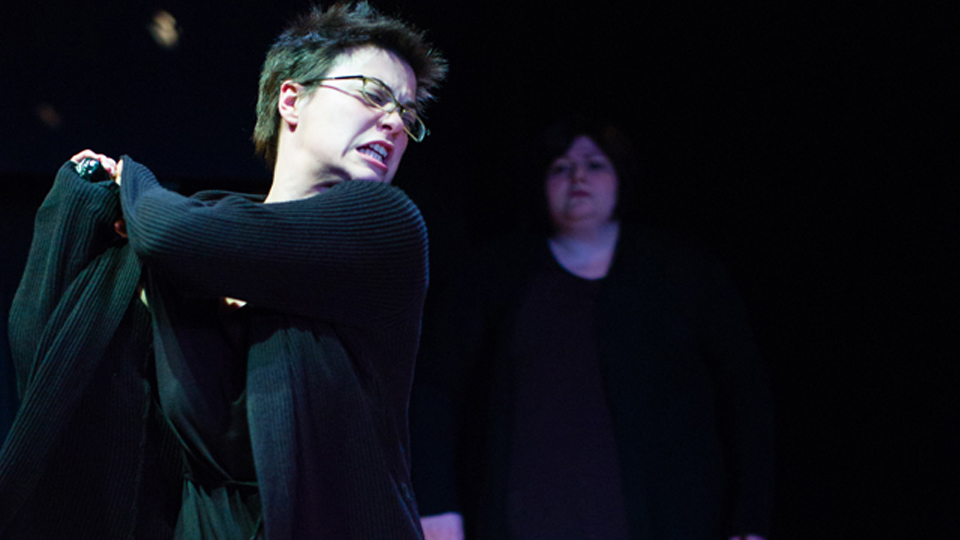Currently playing at The King’s Head Theatre in Islington is Arnold Wesker’s Denial, a powerful one-act play exposing the dangers of therapy and the idea of repressed memories.
When Jenny Young’s marriage disintegrates her life takes a downward spiral into misery and anger. Therapist Valerie Morgan offers easy answers to explain her pain, one of which is that she’s in denial, repressing memories of sexual abuse that occurred when she was young. The possibility consumes Jenny until she accuses both her father Matthew and her now-deceased grandfather of repeatedly assaulting her throughout childhood, throwing suspicion on everyone and tearing her family apart.
Wesker’s play is fifteen years old, but it proves remarkably prescient and remains hugely topical, when the dangerously unregulated psychotherapy industry, where any old charlatan can carve out a lucrative career, is once again in the spotlight. This week’s failed appeal of a counsellor suspended after her client reported malpractice in a case of “reparative therapy” has made markedly different headlines in media outlets on both sides of the political spectrum: with very little focus on the fact that she was suspended for inappropriate behaviour and not for inappropriate therapy. Given the contemporary problem of bad therapists’ easy exploitation of vulnerable people,Denial’s London debut is long overdue, and is a welcome addition to the theatre’s retrospective of Wesker’s work to mark his 80th birthday.
Having said that, there are no certainties in Denial, and it remains ambiguous to the end, leaving the audience to decide which characters command truth and innocence. It’s is a cleverly written and emotionally engaging piece of theatre, and this production boasts an excellent ensemble cast and two standout performances. Clare Cameron (whom we last saw in EF’s top-rated production of 2011, Love, Question Mark) delivers another astonishing performance of raw emotion as the disturbed Jenny Young. Her intense portrayal bears out over the course of the play the terrifying reality of somebody convinced they’re right. Where she violently loses control she shocks the audience into silence through heart-wrenching displays of naked anguish. Cameron gives a brave and acutely-considered performance that it’s impossible to look away from.
Nicholas Gecks’ Matthew, in many ways Jenny’s polar opposite, is also phenomenally good. Often visibly watery-eyed and shaking, his quiet and dignified pain through a trial of vilification proves the calm centre of the play. The final showdown between Cameron and Gecks is consequently a hugely rewarding and profoundly moving payoff.

The other actors contribute to the power of the production. Stephanie Beattie as Jenny’s mother is highly emotive, finding tears readily; but she perfectly balances this with strength and resolve. It’s a shame more is not made of Jenny’s sensible sister Abigail, as Shelley Lang is enjoyably gutsy as a young lawyer who tries to use her skills of intelligence, reason and interrogation to break through to the tempestuous Jenny. The comic relief is provided by Sally Plumb’s therapist Valerie Morgan; though whilst she impresses with deft comic timing there is perhaps more she could make of her character’s journey from being Jenny’s saviour to possibly being the cause of a family’s distress once she starts to lose the audience’s sympathy. Veteran John Bromley adds another contrast with an older voice, but somebody from without who knows the family intimately, and he adds great weight and authority.
There are very few things to negatively criticise about Denial, though on a purely practical level a distractingly squeaky stage floor is one. There’s also Wesker’s use of the character of Sandy Cornwall (a fine study in restrained professionalism by Maggie Daniels), who comes across more as a plot device to help gel together the themes of the story than a person in her own right that we care about, and what she’s actually trying to achieve is slightly confusing and fairly irrelevant. These are ultimately minor complaints about a spellbinding slice of theatre that delivers plenty of moments of sublime drama.
The play doesn’t deny that child abuse is an all-too-real societal problem, though it’s undoubtedly disquieting for the audience when they are forced to reconsider where their sympathies lie. Denial hinges upon whether or not Jenny’s repressed memories are true, and this enables Wesker to maintain high stakes for the duration. Wesker reuses themes that are familiar in his best-known works: vulnerable people are manipulated and possibly even brainwashed by amoral authority figures, and the truth is difficult to establish.
Denial is told with postmodern techniques that reinforce its modernity. Characters remain on stage or nearby when they aren’t meant to be physically present, which utilises Nicholas Gecks to the greatest effect as he loiters in the dark with his back turned just beyond the auditorium whilst his character is torn to shreds by his daughter centre stage. Like a movie, scenes are interrupted and overlaid by other scenes, and a television screen is occasionally ingeniously used. The cumulative effect is a fast-moving and visual piece. Director Adam Spreadbury-Maher keeps a solid grip on the story, and as soon as each character is established (it’s a surprisingly busy stage with seven actors involved in the action) the clarity of the drama keeps you spellbound. Denial works perfectly in the intimate space of The King’s Head Theatre, and the audience’s closeness to the actors vastly heightens the impact of the drama.
It’s not always comfortable viewing, but Denial is thoroughly absorbing drama played with energy and passion, and it provides the audience with a potent vicarious experience. With characters and themes that resonate strongly, Denial proves a pounding and intense experience from start to finish.


